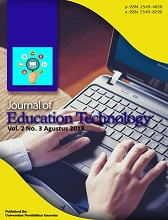LANGUAGE LEARNING GAMES DEVELOPMENT BASED ON CURRICULUM 2013
DOI:
https://doi.org/10.23887/jet.v1i1.10086Keywords:
Language learning game, manual, character educationAbstract
This research aimed at developing character based language learning games in teaching English which can be used by teacher of junior high school grade VII as an alternative activities in the classroom. This research is R&D which used the design from Sugiyono (2011). The data in this study were collected through in depth interview, observation, and questionnaire distribution for both teacher and students. Then the data gained were analyzed qualitatively as the basis to develop the games and manual. As the result, 3 character based language learning games are developed; they are Word Bricks, Race Words dan Snake and Signs games. Validation from experts has been conducted and the scores given indicate that the product designed can be categorized as good games and excellent manual. It is also found that the product developed is categorized as good games and manual based on teacher’s score. After the implementation, it is shown that the students are motivated in learning English by using games. Besides, it is also found that students’ characters are starting to emerge in students who played the games.
References
Aslanabadi, H., Rasouli, G. (2013). The Effect of Games on Improvement of Iranian EFL Vocabulary Knowledge in Kindergartens. International Review of Social Sciences and Humanities, Vol. 6, No. 1 (2013), Hal. 186-195
Azar, A.S. (2012). The Effect of Games on EFL Learners’ Vocabulary Learning Strategies. International Journal of Basic and Applied Science, Vol 01, No. 02, Oct 2012, hal. 252-256
Bradley, L., Lindstrm, B & Rystedt, H. (2010). Rationalities of Collaboration for Language Learning in a Wiki, ReCALL, 22(2) (2010), 247-265.
Cameron, L. (2001) Teaching languages to young learners. Cambridge: Cambridge University Press
Diana, Nova Pravita Rus (2010). The advantages and disadvantages of using games in teaching vocabulary to the third graders of top school elementary school. Retrieved from http://eprints.uns.ac.id/336/1/166750209201011411.pdf.
Ersoz, A. (2000). ‘Six Games for the EFL/ESL Classroom’, in The Internet TESL Journal. Retrieved July 13, 2012 from http://iteslj.org/Lessons/Ersoz-Games.html .
Kemdiknas. (2010). Rencana Aksi Nasional Pendidikan Karakter. Jakarta.
Koksal, U., Cekic, A., & Beyhan, O. (2014). Views od Turkish EFL Students with Regard to Learning Grammar with Games. International Journal on New Trends in Education and Their Implications. Vol:5, Issue:1, Article:,09, Jan 2014, hal. 82-92.
Martin. A. (2003). Motivating students to learn. Retrieved from: https://www.psychology.org.au/publications/inpsych/motivating/. Accessed April 2016
Masri, A.A., Najar, M.A. (2014). The Effect of Using Word Games on Primary Stage Students Achievement in English Language Vocabulary in Jordan. American International Journal of Contemporary Research, Vol. 4, No. 9; September 2014, Hal. 114-152.
Mulyasa. E. (2013). Pengembangan dan Implementasi Kurikulum 2013. Bandung: PT. Remaja Rosdakarya.
Mubaslat, M. M. (2011). The Effect of Using Educational Games on the Students’ Achievement in English Language for the Primary Stage.
Richard, G. &Rogers, J. (2001). The Practice of English Language Teaching. Oxford: Longman.
Sugiyono. (2011). Metode Penelitian Kuantitatif, Kualitatif, dan R&D. Bandung: Penerbit Alfabeta.
Tuan.L.T &.Nguyen.(2010) Teaching English grammar through games. Studies in Literature and Language Vol. 1, No. 7, pp. 61-75
Uberman, A. (1998). ‘The use of games for vocabulary presentation and revision’. Forum, 36(1), 20-27. Retrieved February 12, 2006, from http://exchanges.state.gov/forum/vols/vol36/no1/p20.htm .
Wright, A., Batteridge, D., & Buckby, M. (2005). Games for Language Learning(3rd ed.). New York: Cambridge University Press.
Downloads
Published
How to Cite
Issue
Section
License
Authors who publish with the Journal of Education Technology agree to the following terms:
- Authors retain copyright and grant the journal the right of first publication with the work simultaneously licensed under a Creative Commons Attribution License (CC BY-SA 4.0) that allows others to share the work with an acknowledgment of the work's authorship and initial publication in this journal.
- Authors are able to enter into separate, additional contractual arrangements for the non-exclusive distribution of the journal's published version of the work (e.g., post it to an institutional repository or publish it in a book), with an acknowledgment of its initial publication in this journal.
- Authors are permitted and encouraged to post their work online (e.g., in institutional repositories or on their website) prior to and during the submission process, as it can lead to productive exchanges, as well as earlier and greater citation of published work. (See The Effect of Open Access)

















